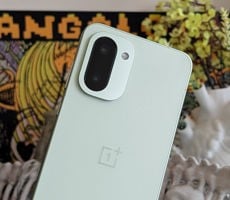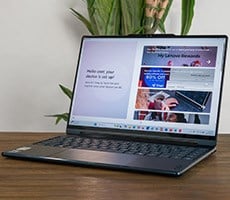Skinning something like Android 8.0
Oreo can be a slippery slope, because refinements made to the OS owith its more recent releases have helped morph Android into a refreshingly feature-complete experience that really doesn't need much additional polish. However, LG does a reasonably good job of adding a few hooks here and there where needed and then getting out of the way when not.




Unlike Samsung, that tries to reinvent the wheel for Android at every turn, LG's skins are a much lighter affair. The UI lets
Android handle most of the functionality, while providing a flat, unobtrusive color scheme to the interface in general, along with specific controls for major functionality upgrades like LG's HiFi Quad DAC and Second Screen controls. And LG's 32-bit HiFi Quad DAC is no gimmick either. The feature delivers a notable upgrade in audio fidelity, with better dynamic range that you especially notice over a high quality set of headphones and with good source audio.



One area where LG's software functionality shines is its camera setup. Three additional primary shot modes are represented on the main camera home screen and you can choose from
Google Lens (AI-assisted image recognition), Portait mode for bokeh depth of field blur effects, and AI Cam, which is an LG-built shot lighting and color optimization feature. Then there's LG's Manual shot mode which is one of the best manual setups on the market in our opinion. Here you get control over everything from Focus to White Balance, ISO, etc. LG also brought its Graphy feature along for its G7 ThinQ ride, with the ability to shoot in modes taken from a database of presets dialed in from professional photographers.



Google Lens works pretty well and can assist with product price search and image identification and information depending on your surroundings. LG's
AI Cam provides interesting shot optimization suggestions based on subject identification. In practice, we found the Auto mode setting in AI Cam did help to optimize lighting and color balance in a shot, though some of recommended alternative setups (seen in the shot with the guitar above) weren't of much use. LG's AI Cam did a reasonably good job of identifying its subject, but we found just leaving it set to auto-optimize worked best in most situations.
LG G7 ThinQ Vs. Google Pixel 2 XL Shot Comparison
We pit the LG G7 ThinQ's camera against the undeniable camera prowess of Google's Pixel 2 XL, which is widely regarded as one of the best smartphone camera systems on the market. Settings for both phone were configured for Auto HDR and for the G7 ThinQ, we left it in either Auto AI Cam mode or standard Auto mode. Take a look...

 LG G7 ThinQ (Left) - Google Pixel 2 XL (Right)
LG G7 ThinQ (Left) - Google Pixel 2 XL (Right)

 LG G7 ThinQ (Left) - Google Pixel 2 XL (Right)
LG G7 ThinQ (Left) - Google Pixel 2 XL (Right)


LG G7 ThinQ (Left) - Google Pixel 2 XL (Right)
 LG G7 ThinQ With AI Cam
LG G7 ThinQ With AI Cam

 LG G7 ThinQ (Left) - Google Pixel 2 XL (Right)
LG G7 ThinQ (Left) - Google Pixel 2 XL (Right)
 LG G7 ThinQ With AI Cam
LG G7 ThinQ With AI Cam

 LG G7 ThinQ (Left) - Google Pixel 2 XL (Right)
LG G7 ThinQ (Left) - Google Pixel 2 XL (Right)
 LG G7 ThinQ With AI Cam
LG G7 ThinQ With AI Cam

 LG G7 ThinQ With AI Cam (Left) - Google Pixel 2 XL (Right)
LG G7 ThinQ With AI Cam (Left) - Google Pixel 2 XL (Right)
 LG G7 ThinQ Wide Angle Shot
LG G7 ThinQ Wide Angle Shot
Beauty is in the eye of the beholder, as they say, but there are some fairly prominent observations we can make here. First, the G7 ThinQ produces more vibrant shots that can be
slightly over-saturated in some circumstances, while the
Google Pixel 2 XL shoots things rather drab at times, lacking the color reproduction of the G7. In mixed light or low light shots, the Pixel 2 does seem to produce slightly sharper images with a touch more detail (the sky/trees shot), but again sometimes at the expense of color reproduction and saturation. One advantage for the G7 was its Portait mode shooting, where the G7 was not only able to get more of the scene in the frame, but also shoot a more crisp, well defined foreground image, while maintaining adequate background blur and better color rendering.
Again, image quality is a personal preference area, but we think the
LG G7 ThinQ holds up quiet well versus some of the best smartphone cameras on the market currently and with a fantastic Portrait mode to boot. Video image quality is also solid as well, with good image stabilization and autofocus response.


























